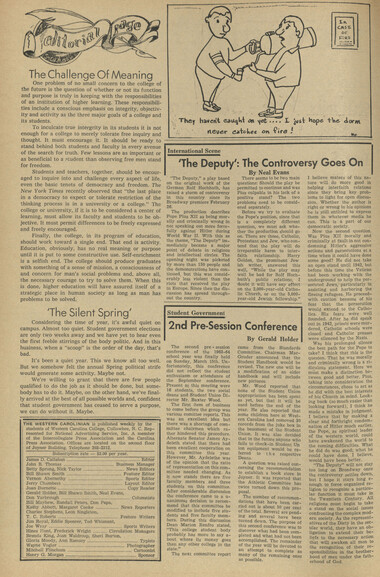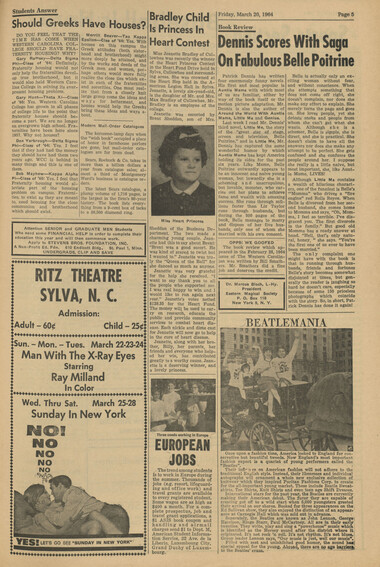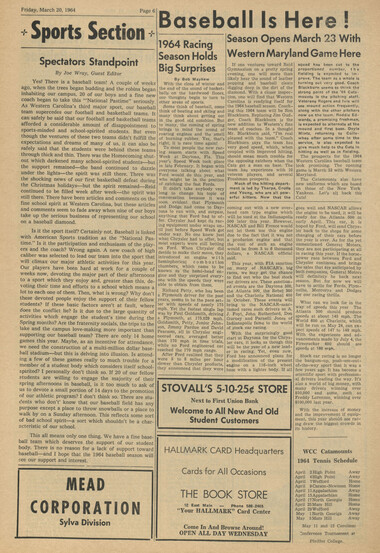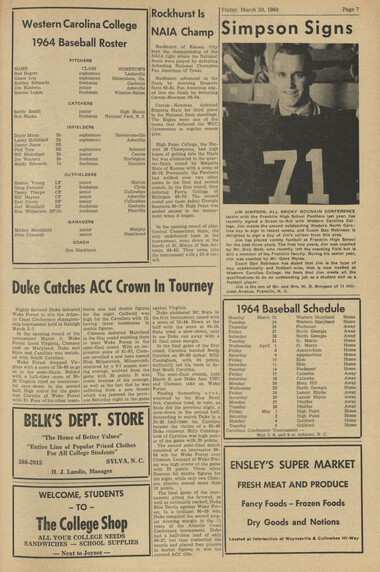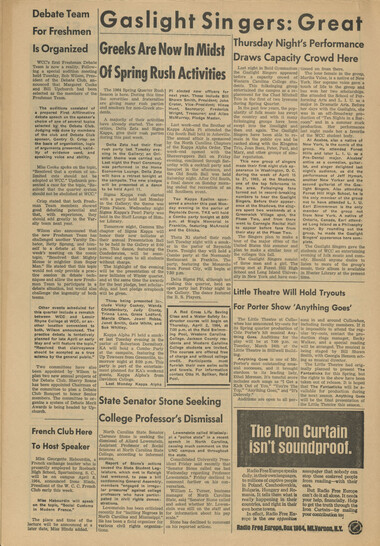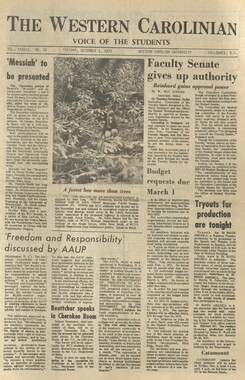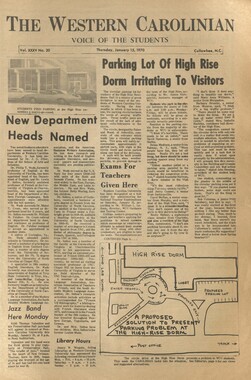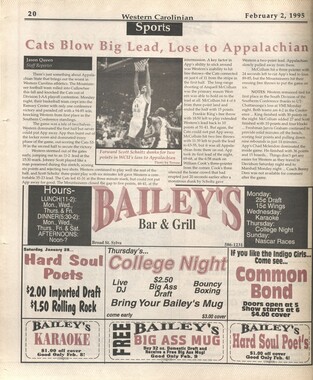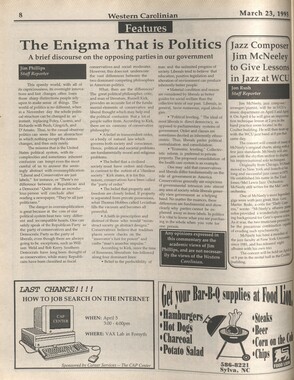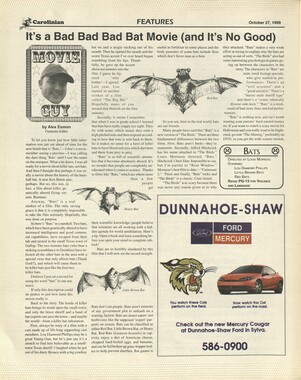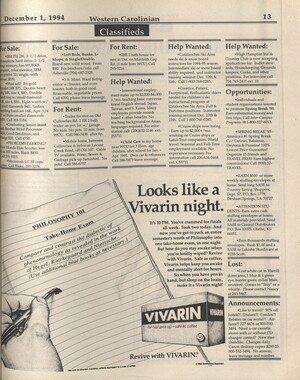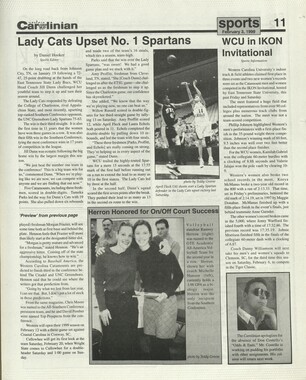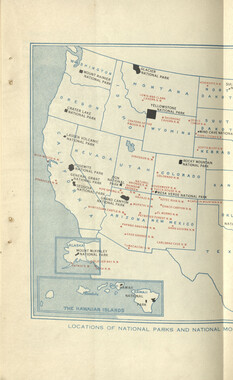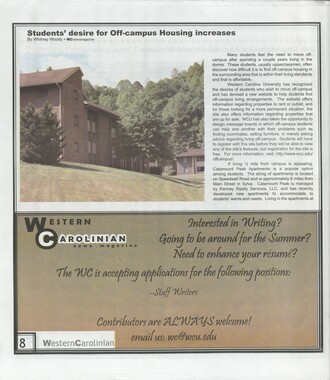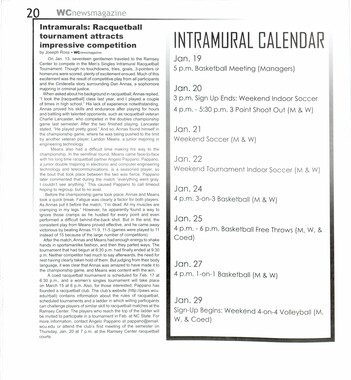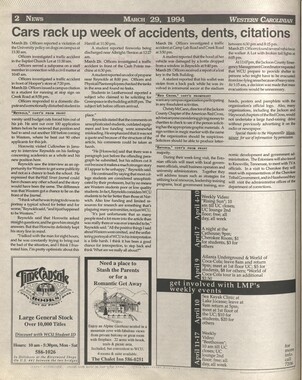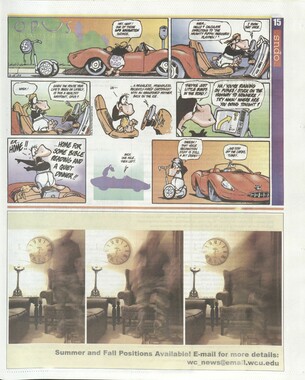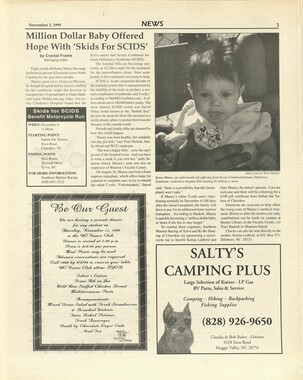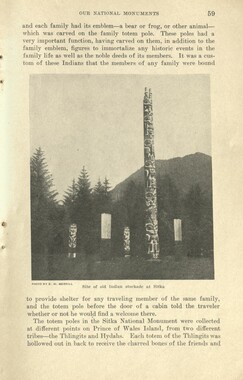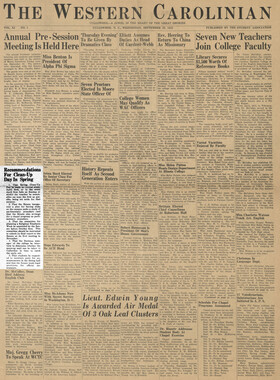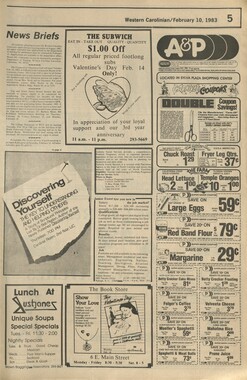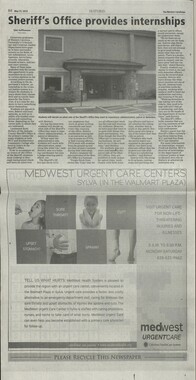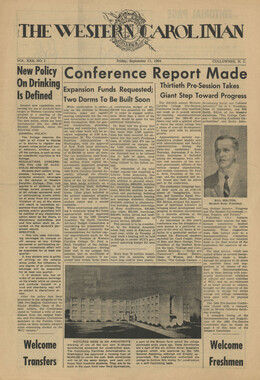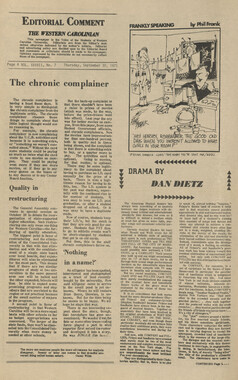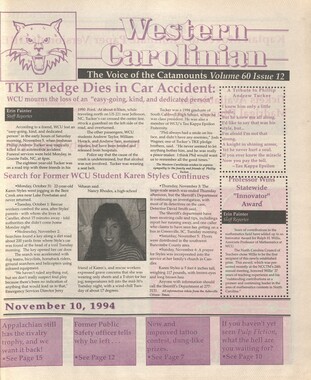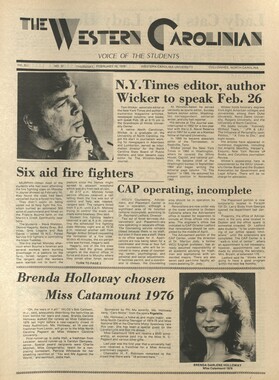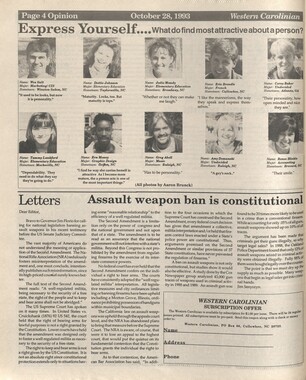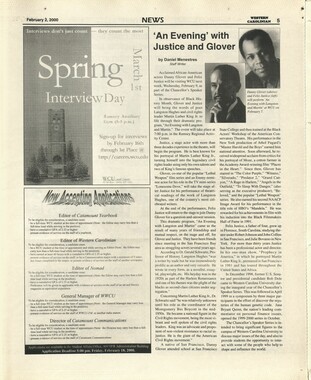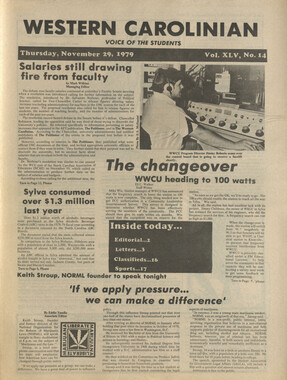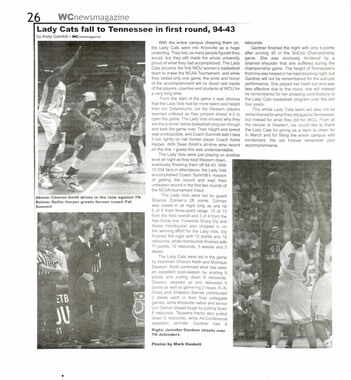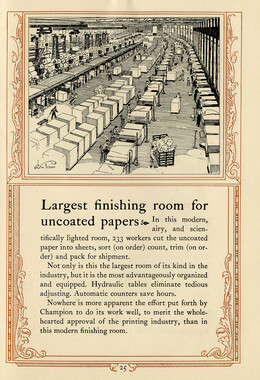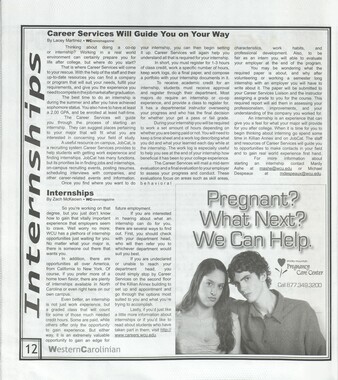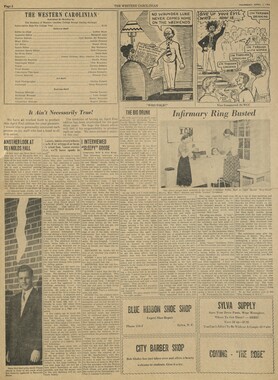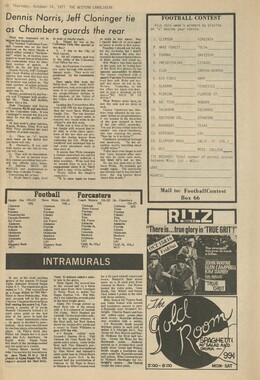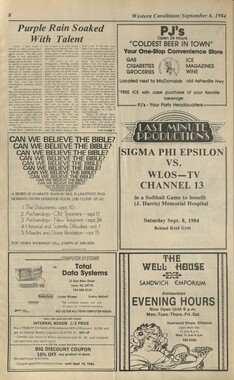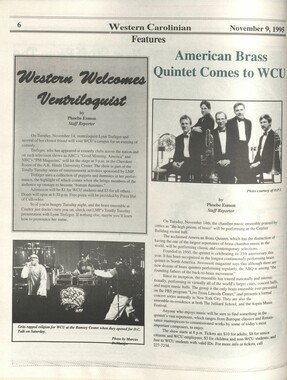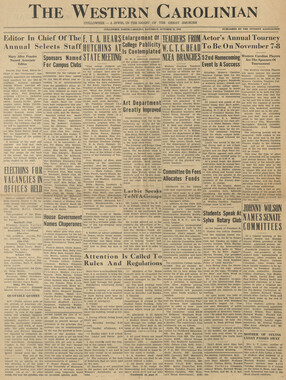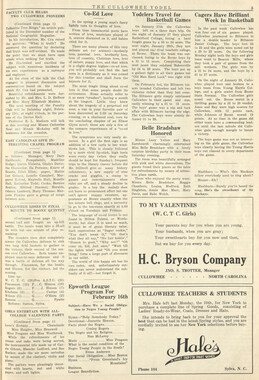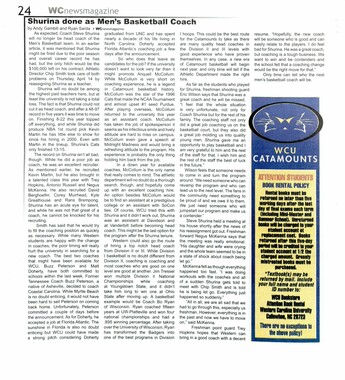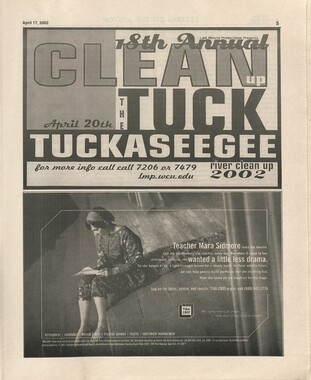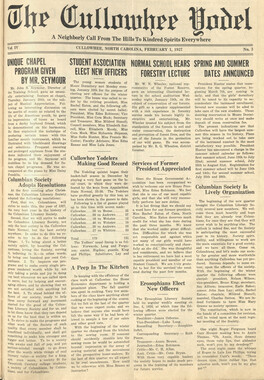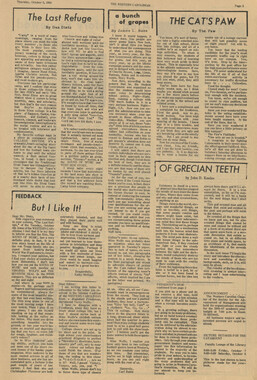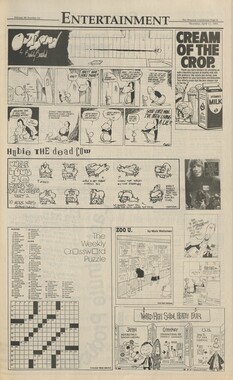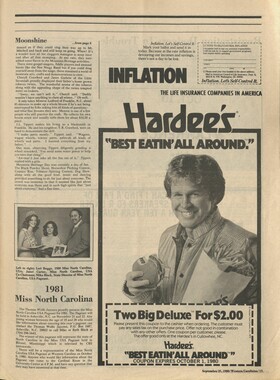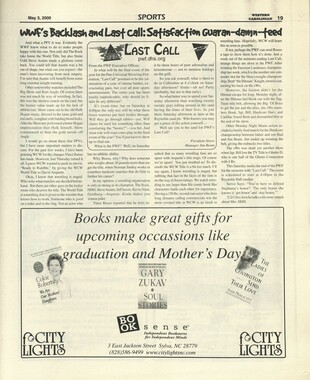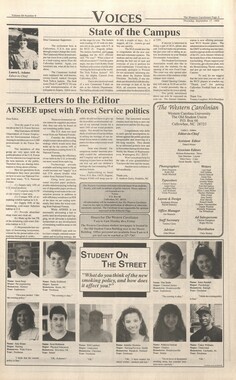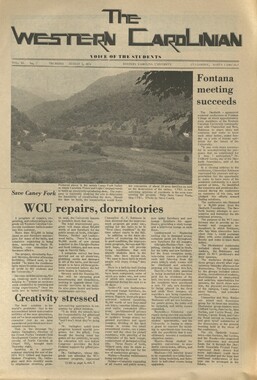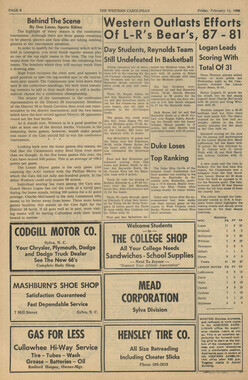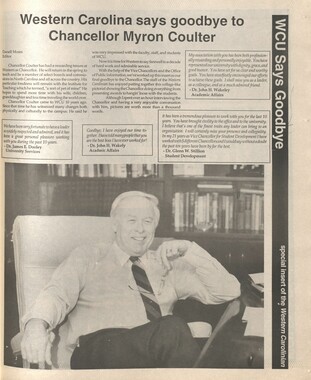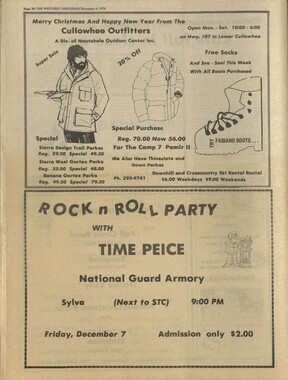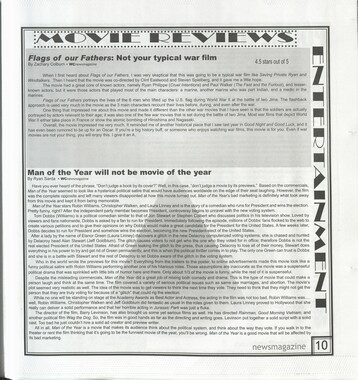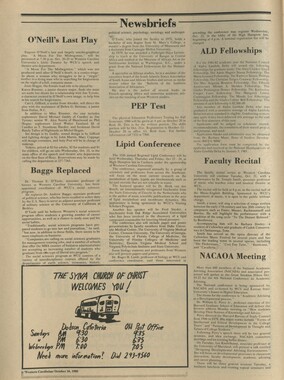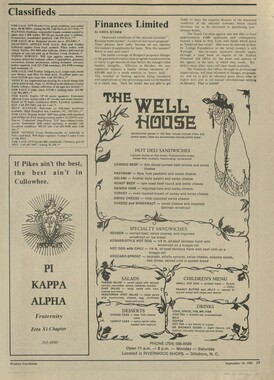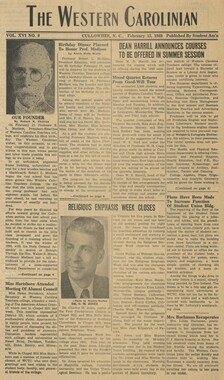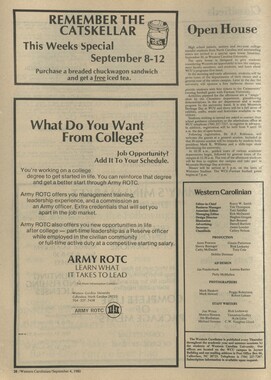Western Carolina University (21)
View all
- Canton Champion Fibre Company (2308)
- Cherokee Traditions (291)
- Civil War in Southern Appalachia (165)
- Craft Revival (1942)
- George Masa Collection (137)
- Great Smoky Mountains - A Park for America (2900)
- Highlights from Western Carolina University (422)
- Horace Kephart (973)
- Journeys Through Jackson (159)
- LGBTQIA+ Archive of Jackson County (85)
- Oral Histories of Western North Carolina (316)
- Picturing Appalachia (6797)
- Stories of Mountain Folk (413)
- Travel Western North Carolina (153)
- Western Carolina University Fine Art Museum Vitreograph Collection (129)
- Western Carolina University Herbarium (92)
- Western Carolina University: Making Memories (738)
- Western Carolina University Publications (2491)
- Western Carolina University Restricted Electronic Theses and Dissertations (146)
- Western North Carolina Regional Maps (71)
- World War II in Southern Appalachia (131)
University of North Carolina Asheville (6)
View all
- Allanstand Cottage Industries (62)
- Appalachian National Park Association (53)
- Bennett, Kelly, 1890-1974 (1463)
- Berry, Walter (76)
- Brasstown Carvers (40)
- Carver, George Washington, 1864?-1943 (26)
- Cathey, Joseph, 1803-1874 (1)
- Champion Fibre Company (233)
- Champion Paper and Fibre Company (297)
- Cherokee Indian Fair Association (16)
- Cherokee Language Program (22)
- Crowe, Amanda (40)
- Edmonston, Thomas Benton, 1842-1907 (7)
- Ensley, A. L. (Abraham Lincoln), 1865-1948 (275)
- Fromer, Irving Rhodes, 1913-1994 (70)
- George Butz (BFS 1907) (46)
- Goodrich, Frances Louisa (120)
- Grant, George Alexander, 1891-1964 (96)
- Heard, Marian Gladys (60)
- Kephart, Calvin, 1883-1969 (15)
- Kephart, Horace, 1862-1931 (313)
- Kephart, Laura, 1862-1954 (67)
- Laney, Gideon Thomas, 1889-1976 (439)
- Masa, George, 1881-1933 (61)
- McElhinney, William Julian, 1896-1953 (44)
- Niggli, Josephina, 1910-1983 (10)
- North Carolina Park Commission (105)
- Osborne, Kezia Stradley (9)
- Owens, Samuel Robert, 1918-1995 (11)
- Penland Weavers and Potters (36)
- Roberts, Vivienne (15)
- Roth, Albert, 1890-1974 (142)
- Schenck, Carl Alwin, 1868-1955 (1)
- Sherrill's Photography Studio (2565)
- Southern Highland Handicraft Guild (127)
- Southern Highlanders, Inc. (71)
- Stalcup, Jesse Bryson (46)
- Stearns, I. K. (213)
- Thompson, James Edward, 1880-1976 (226)
- United States. Indian Arts and Crafts Board (130)
- USFS (683)
- Vance, Zebulon Baird, 1830-1894 (1)
- Weaver, Zebulon, 1872-1948 (58)
- Western Carolina College (230)
- Western Carolina Teachers College (282)
- Western Carolina University (2008)
- Western Carolina University. Mountain Heritage Center (18)
- Whitman, Walt, 1819-1892 (10)
- Wilburn, Hiram Coleman, 1880-1967 (73)
- Williams, Isadora (3)
- Cain, Doreyl Ammons (0)
- Crittenden, Lorraine (0)
- Rhodes, Judy (0)
- Smith, Edward Clark (0)
- Appalachian Region, Southern (2959)
- Asheville (N.C.) (1944)
- Avery County (N.C.) (26)
- Blount County (Tenn.) (195)
- Buncombe County (N.C.) (1680)
- Cherokee County (N.C.) (283)
- Clay County (N.C.) (556)
- Graham County (N.C.) (238)
- Great Smoky Mountains National Park (N.C. and Tenn.) (525)
- Haywood County (N.C.) (3573)
- Henderson County (N.C.) (70)
- Jackson County (N.C.) (4919)
- Knox County (Tenn.) (35)
- Knoxville (Tenn.) (13)
- Lake Santeetlah (N.C.) (10)
- Macon County (N.C.) (421)
- Madison County (N.C.) (216)
- McDowell County (N.C.) (39)
- Mitchell County (N.C.) (135)
- Polk County (N.C.) (35)
- Qualla Boundary (982)
- Rutherford County (N.C.) (78)
- Swain County (N.C.) (2185)
- Transylvania County (N.C.) (270)
- Watauga County (N.C.) (12)
- Waynesville (N.C.) (86)
- Yancey County (N.C.) (72)
- Aerial Photographs (3)
- Aerial Views (60)
- Albums (books) (4)
- Articles (1)
- Artifacts (object Genre) (228)
- Bibliographies (1)
- Biography (general Genre) (2)
- Cards (information Artifacts) (38)
- Clippings (information Artifacts) (192)
- Copybooks (instructional Materials) (3)
- Crafts (art Genres) (622)
- Depictions (visual Works) (21)
- Design Drawings (1)
- Digital Moving Image Formats (2)
- Drawings (visual Works) (185)
- Envelopes (101)
- Exhibitions (events) (1)
- Facsimiles (reproductions) (1)
- Fiction (general Genre) (4)
- Financial Records (12)
- Fliers (printed Matter) (67)
- Glass Plate Negatives (381)
- Guidebooks (2)
- Internegatives (10)
- Interviews (817)
- Land Surveys (102)
- Letters (correspondence) (1045)
- Manuscripts (documents) (618)
- Maps (documents) (177)
- Memorandums (25)
- Minutes (administrative Records) (59)
- Negatives (photographs) (6090)
- Newsletters (1290)
- Newspapers (2)
- Notebooks (8)
- Occupation Currency (1)
- Paintings (visual Works) (1)
- Pen And Ink Drawings (1)
- Periodicals (193)
- Personal Narratives (10)
- Photographs (12976)
- Plans (maps) (1)
- Poetry (6)
- Portraits (4568)
- Postcards (329)
- Programs (documents) (181)
- Publications (documents) (2444)
- Questionnaires (65)
- Relief Prints (26)
- Sayings (literary Genre) (1)
- Scrapbooks (282)
- Sheet Music (2)
- Slides (photographs) (402)
- Songs (musical Compositions) (2)
- Sound Recordings (796)
- Specimens (92)
- Speeches (documents) (18)
- Tintypes (photographs) (8)
- Transcripts (324)
- Text Messages (0)
- A.L. Ensley Collection (275)
- Appalachian Industrial School Records (7)
- Appalachian National Park Association Records (336)
- Axley-Meroney Collection (2)
- Bayard Wootten Photograph Collection (20)
- Bethel Rural Community Organization Collection (7)
- Blumer Collection (5)
- C.W. Slagle Collection (20)
- Canton Area Historical Museum (2110)
- Carlos C. Campbell Collection (462)
- Cataloochee History Project (64)
- Cherokee Studies Collection (4)
- Daisy Dame Photograph Album (5)
- Daniel Boone VI Collection (1)
- Doris Ulmann Photograph Collection (112)
- Elizabeth H. Lasley Collection (1)
- Elizabeth Woolworth Szold Fleharty Collection (4)
- Frank Fry Collection (95)
- George Masa Collection (173)
- Gideon Laney Collection (452)
- Hazel Scarborough Collection (2)
- Hiram C. Wilburn Papers (28)
- Historic Photographs Collection (236)
- Horace Kephart Collection (861)
- Humbard Collection (33)
- Hunter and Weaver Families Collection (1)
- I. D. Blumenthal Collection (4)
- Isadora Williams Collection (4)
- Jesse Bryson Stalcup Collection (47)
- Jim Thompson Collection (224)
- John B. Battle Collection (7)
- John C. Campbell Folk School Records (80)
- John Parris Collection (6)
- Judaculla Rock project (2)
- Kelly Bennett Collection (1482)
- Love Family Papers (11)
- Major Wiley Parris Civil War Letters (3)
- Map Collection (12)
- McFee-Misemer Civil War Letters (34)
- Mountain Heritage Center Collection (4)
- Norburn - Robertson - Thomson Families Collection (44)
- Pauline Hood Collection (7)
- Pre-Guild Collection (2)
- Qualla Arts and Crafts Mutual Collection (12)
- R.A. Romanes Collection (681)
- Rosser H. Taylor Collection (1)
- Samuel Robert Owens Collection (94)
- Sara Madison Collection (144)
- Sherrill Studio Photo Collection (2558)
- Smoky Mountains Hiking Club Collection (616)
- Stories of Mountain Folk - Radio Programs (374)
- The Reporter, Western Carolina University (510)
- Venoy and Elizabeth Reed Collection (16)
- WCU Gender and Sexuality Oral History Project (32)
- WCU Mountain Heritage Center Oral Histories (25)
- WCU Oral History Collection - Mountain People, Mountain Lives (71)
- WCU Students Newspapers Collection (1923)
- Western North Carolina Tomorrow Black Oral History Project (69)
- William Williams Stringfield Collection (2)
- Zebulon Weaver Collection (109)
- African Americans (390)
- Appalachian Trail (35)
- Artisans (521)
- Cherokee art (84)
- Cherokee artists -- North Carolina (10)
- Cherokee language (21)
- Cherokee pottery (101)
- Cherokee women (208)
- Church buildings (190)
- Civilian Conservation Corps (U.S.) (111)
- College student newspapers and periodicals (2012)
- Dams (108)
- Dance (1023)
- Education (222)
- Floods (63)
- Folk music (1015)
- Forced removal, 1813-1903 (2)
- Forest conservation (220)
- Forests and forestry (1197)
- Gender nonconformity (4)
- Great Smoky Mountains National Park (N.C. and Tenn.) (181)
- Hunting (46)
- Landscape photography (25)
- Logging (119)
- Maps (83)
- Mines and mineral resources (9)
- North Carolina -- Maps (18)
- Paper industry (38)
- Postcards (255)
- Pottery (135)
- Railroad trains (72)
- Rural electrification -- North Carolina, Western (3)
- School integration -- Southern States (2)
- Segregation -- North Carolina, Western (5)
- Slavery (5)
- Sports (452)
- Storytelling (243)
- Waterfalls -- Great Smoky Mountains (N.C. and Tenn.) (66)
- Weaving -- Appalachian Region, Southern (280)
- Wood-carving -- Appalachian Region, Southern (328)
- World War, 1939-1945 (173)
Western Carolinian Volume 29 Number 19
Item
Item’s are ‘child’ level descriptions to ‘parent’ objects, (e.g. one page of a whole book).
-
-
The Challenge Of Meaning One problem of no small concern to the college of the future is the question of whether or not its function and purpose is truly in keeping with the responsibilities of an institution of higher learning. These responsibilities include a conscious emphasis on integrity, objectivity and activity as the three major goals of a college and its students. To inculcate true intergrity in its students it is not enough for a college to merely tolerate free inquiry and thought. It must encourage it. It should be ready to stand behind both students and faculty in every avenue of the search for truth. Few lessons are as important or as beneficial to a student than observing free men stand for freedom. Students and teachers, together, should be encouraged to inquire into and challenge every aspect of life, even the basic tenets of democracy and freedom. The New York Times recently observed that "the last place in a democracy to expect or tolerate restriction of the thinking process is in a university or a college." The college or university, if it is to be considered a center of learning, must allow its faculty and students to be objective. It must permit differences to be freely expressed and freely encouraged. Finally, the college, in its program of education, should work toward a single end. That end is activity. Education, obviously, has no real meaning or purpose until it is put to some constructive use. Self-enrichment is a selfish end. The college should produce graduates with something of a sense of mission, a consciousness of and concern for man's social problems and, above all, the necessary courage to try to solve them. When this is done, higher education will have assured itself of a strategic place in human society as long as man has problems to be solved. The Silent Spring' Considering the time of year, it's awful quiet on campus. Almost too quiet. Student government elections are only two weeks away and we have yet to hear even the first feeble stirrings of the body politic. And in this business, when a "scoop" is the order of the day, that's bad. It's been a quiet year. This we know all too well. But we somehow felt the annual Spring political strife would generate some activity. Maybe not. We're willing to grant that there are few people qualified to do the job as it should be done, but somebody has to do it. Maybe, on the other hand, we've finally arrived at the best of all possible worlds and, confident that student government has ceased to serve a purpose, we can do without it. Maybe. THE WESTERN CAROLINIAN is published weekly by the students of Western Carolina College, Cullowhee, N. C. Represented for National Advertising Service, Inc. A member of the Intercollegiate Press Association and the Carolina Press Association. Offices are located on the second floor of Joyner Building. Telephone 293-2312. Subscription rate — $2.00 per year. James D. Callahan Editor John B. Thomas Business Manager Betty Sprung, Nick Taylor News Editors Bill Shawn Smith Feature Editor Vernon Abernethy Sports Editor Jerry Chambers Layout Editor Joan Burnette Copy Reader Gerald Holder, Bill Shawn Smith, Neal Evans, Don Yarbrough Columnists Bill Mayhew, Randall Peters, Don Papa, Kathy Abbott, Margaret Cooke News Reporters Charles Stephens, Leon Singleton, T. C. Roberts Feature Writers Jim Royal, Eddie Spencer, Ted Whisnant, Joe Wray Sports Writers Hines Hunt, Frederick Wright Circulation Managers Brenda King, Joan Waldroup, Sherl Burton, Gloria Moody, Ann Ramsey Typists Wayne Vogler Photographer Mitchell Flinchum Cartoonist Henry G. Morgan „ Sponsor They haven't oauqM an >jat.... X JytV Hope tW. <Aorm rieuer fi*i»kec on xird i JtE. International Scene 'The Deputy7: The Controversy Goes On "The Deputy," a play based on the original work of the German Rolf Hochhuth, has raised a storm of controversy in this country since its Broadway premiere February 26. The production describes Pope Pius XII as being morally and criminally wrong in not speaking out more forcefully against Hitler during World War II. With this as the theme, "The Deputy" immediately became a major point of debate in religious and intellectual circles. The opening night was picketed by more than 150 people and the demonstrations have continued, but this was considerably less violent than the riots that received the play in Europe. Since then the discussion has spread throughout the country. By Neal Evans There seems to be two main questions: Should the play be permitted to continue and was Pius culpable in his lack of a positive stand? The two problems need to be considered separately. Before we try to evaluate the Pope's position, since that is a completely different question, we must ask whether the production should go on. There are those, Catholic, Protestant and Jew, who contend that the play will do irreparable harm to inter- faith relationship. Harry Golden, the prominent Jew ish writer, answered this well, "While the play may well be bad for Rolf Hoch- huth's public relations, I doubt it will have any effect on the 2,000-year-old Catholic Church, or on the 5,000- year-old Jewish fellowship." Student Governmeni 2nd Pre-Session Conference By Gerald Holder The second pre - session conference of the 1963-64 school year was finally held on Sunday, March 15th. Unfortunately, this conference did not reflect the student enthusiasm or attendance of the September conference. Present at this meeting were 16 students, the two social deans and Student Union Director Mr. Baxter Wood. The first item of business to come before the group was various comittee reports. This was an excellent idea but there was a shortage of committee chairmen which rather hindered this procedure. Alternate Senator James Ay- deleth stated that there had been excellent cooperation on this committee this year. However, Mr. Aydelethe was of the opinion that the ratio of representation on this committee needed changing. As it now stands there are five faculty members and three students on this committee. After considerable discussion the conference came to a u- nanimous decision to recommend that this committee be modified to include five students and five faculty members. During this discussion Dean Marion Renfro stated, "This college student body probably has more to say a- bout where its money goes than any other college in the state." The next committee report came from the Standards Committee. Chairman Mac- Gruder announced that the Student Handbook would be revised. The new one will be a modification of an older handbook and will include new pictures. Mr. Wood reported that none of the Student Union appropriation has been spent as yet, but that it will be used before the end of the year. He also reported that some children here at Western Carolina had removed 30 records from the juke box in the basement of the Student Union. It was also decided that in the future anyone who fails to check-in Student Un ion equipment would be referred to the respective Deans. A question was raised concerning the recommendation to establish a book store in Joyner. It was reported that the Athletic Committee has twice turned down this proposal. The number of recommendations that have been carried out is about 50 per cent of the total. Several are pending and several have been turned down. The purpose of this second conference was to discover what had been completed and what had not been accomplished. The remainder of the year will be devoted to an attempt to complete as many of the remaining ones as possible. I believe maters of this nature will do more good in helping interfaith relations since they bring key problems to light for open discussion. Whether the author is right or wrong in his opinions he is still entitled to express them in whatever media he can. This is a part of our democratic society. Now the second question. Was Pius XII morally and criminally at fault in not condemning Hitler's aggressive actions and persecutions at a time when it could have done some good? He did not take an open stand until 1942, but before this time the Vatican had been working with the underground to help the persecuted Jews, particularly in assisting and harboring the fleeing refugees. He proceed- with caution because of his fear that the persecution would extend to the Catholics. His fears were well founded. After he did speak out in 1942, priests were murdered, Catholic schools were closed and Catholic presses were silenced by the Nazis. Was his prolonged silence the best path for the Pope to take? I think that this is the quesion. That he was morally and criminally wrong is a ridiculous statement. Here we must make a distinction between good and better. Pius, taking into consideration the circumstances, chose to act as he did with the best interests of his Church in mind. Looking back (so much easier than looking forward), I think he made a mistake in judgment. I believe that by making a clear and forthright condemnation of Hitler much earlier, the Pope, as spiritual leader of the western world, could have awakened the world to the coming difficulties. What he did do was good; what he could have done, I believe, would have been better. "The Deputy" will not stay too long on Broadway once the controversy settles down, but I hope it stays long e- nough to force organized religion to recognize a particular function it must take in the Twentieth Century. All religions must begin to take a stand on the social issues confronting the complex modern society. As the representatives of the Diety in the secular world, they have an obligation to extend their beliefs to the necessary action that will awaken all men to the recognition of their responsibilities in the brotherhood of men under the fatherhood of God.
Object
Object’s are ‘parent’ level descriptions to ‘children’ items, (e.g. a book with pages).
-
The Western Carolinian is Western Carolina University’s student-run newspaper. The paper was published as the Cullowhee Yodel from 1924 to 1931 before changing its name to The Western Carolinian in 1933.
-
